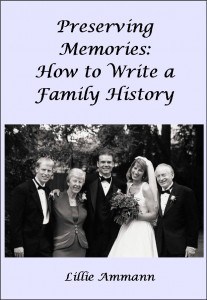
November seems to be filled with writing events.
Many writers are taking part in NaNoWriMo (National Novel Writing Month), in which writers commit to writing a 50,000 word book in thirty days. Of course, the first draft is only the beginning, and there is a lot more work to be done after typing “the end.” But NaNoWriMo is a great way to jump start a novel.
November 15th is I Love to Write Day. While it’s called “The World’s Biggest Party For Writers,” it’s not just for professional writers. Everyone who loves to write is encouraged to write something—a poem, a letter, a story, an essay…anything—on I Love to Write Day.
November is also National Lifewriting Month and Family Stories Month. I’m passionate about remembering family stories because my family hasn’t done a good job of that. My grandfather was a cowboy, and I remember as a small child joining my siblings and cousins to hear Grandpa’s stories. We sat on the floor around his chair, and he shared his exciting cowboy experiences. The adults in the family were sure no one would ever forget those stories.
However, my grandfather died when I was twelve, and no one talked about the stories any more. By the time I wanted to record those stories for posterity, most of the adults were gone. Those who were left no longer remembered the stories no one ever expected to forget.
I didn’t want to lose any more family stories. As a result of my urging, my mother wrote memories of her life in the form of individual stories. She wrote things as she remembered them. The first year she did this, I typed up the stories, editing lightly but retaining my mother’s voice and conversational tone.
I added photos, printed out the stories, organized them chronologically, and put them in three-ring binders with a cover created on my computer. Mama gave a binder to each of her children for Christmas. In the following years, she wrote additional stories throughout the year. I typed them and printed them with photos, and Mama gave a set to each of my siblings and me to add to the binder.
When the family got together and opened Christmas gifts, teenage grandkids would set aside their own presents and ask their parents, “What did Granny write about this time?”
Because my mother’s stories were such a success, I asked my mother-in-law to record her life experiences. She spoke into a tape recorder, and she shared her life in chronological order. I transcribed the recordings, added photos, and created binders for my husband’s family like those made for my family.
While everyone enjoyed the stories from the first reading, those little books became even more precious after the deaths of my mother and my mother-in-law. We could read their stories and imagine we heard them talking to us again. Unlike my grandfather’s cowboy stories, these stories won’t be forgotten.
My first novel, Stroke of Luck, was autobiographical to a great extent. Although the romance was a creation of my imagination, the stroke and its aftermath experienced by the heroine were just like my stroke. The care given to her by the hero was just like the care given by my hero, my husband.
I’ve told a lot of family stories here on my blog. After my husband’s death, I compiled anecdotes and memories shared by family and friends into a book, Jack Stories. I encourage everyone to record their family stories, whatever form that takes.
With dual celebrations of Family Stories Month and National Lifewriting Month, November is a great time to record those precious memories. An added bonus is Thanksgiving, when families often gather together, creating a wonderful opportunity to interview family members and share memories and family stories.
If you want to write a memoir or family history but aren’t sure where to begin, my short ebook Preserving Memories: How to Write a Family History can help. Whether you want to collect family stories in three-ring binders for immediate family members, publish a book without intending to market and sell it, or publish a book you want to get into bookstores, you’ll find tips and resources to make the process easier.
I’ve been blessed to work with a number of fantastic writers on a lot of great books. My favorites, however, tend to be family stories and memoirs. I’ve just finished a memoir for a ninety-three-year-old World War II veteran. The proof copy of the book is on its way, and soon he will have copies to give to family members and friends. Although he finally agreed to make the book available on Amazon.com, he is not interested in selling books. He just wants loved ones to know and remember his life.
Other family stories my clients have written include memoirs and fictionalized accounts of family history:
- Base Jumping: The Vagabond Life of a Military Brat by William Willis
- Children of the Revolution by David Bowles
- My Life Story: Adventures of the Great Dane by Borge Hansen
- Adam’s Daughters by David Bowles
- Some Monument to Last: Memoir of TV Journalist James Munoz with Family Poems and Letters by James Michael Doughty
- Spring House by David Bowles
- The Last Boat Out: Memoirs of a Triumphant Vietnamese-American Family by Truong Nhu Dinh & Tran Thi Truong Nga, translated by Truong Nhu Kenny & Ton-Nu Phuong-Thao
Have you done any lifewriting or shared family stories? If not, do you want to preserve precious memories? I strongly encourage you to record your family stories for future generations. There’s no greater legacy you can leave your family than your own stories.
